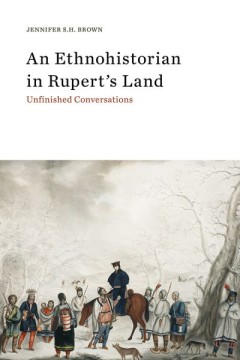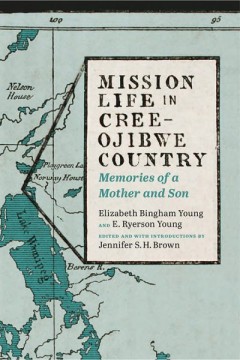Filter by

From Turtle Island to Gaza
With a sure voice, Groulx, an Anishnaabe writer, artistically weaves together the experiences of Indigenous peoples in settler Canada with those of the people of Palestine, revealing a shared understanding of colonial pasts and presents.
- Edition
- -
- ISBN/ISSN
- 9781771992619.01
- Collation
- -
- Series Title
- Mingling Voices
- Call Number
- 5 x 7.5, 68 pages

An Ethnohistorian in Rupert’s Land Unfinished Conversations
In 1670, the ancient homeland of the Cree and Ojibwe people of Hudson Bay became known to the English entrepreneurs of the Hudson’s Bay Company as Rupert’s Land, after the founder and absentee landlord, Prince Rupert. For four decades, Jennifer S. H. Brown has examined the complex relationships that developed among the newcomers and the Algonquian communities—who hosted and tolerated the …
- Edition
- -
- ISBN/ISSN
- 9781771991711.01
- Collation
- -
- Series Title
- -
- Call Number
- 6 x 9, 368 pages

The Muslim Brotherhood and its Quest for Hegemony in Egypt
Annette Ranko analyses the Muslim Brotherhood’s challenging of the Mubarak regime and the ensuing struggle between the two from 1981 to 2011. She furthermore traces how the group evolved throughout the process of that struggle. She studies how the Brotherhood’s portrayal of itself as an attractive alternative to the regime provoked the Mubarak regime to level anti-Brotherhood propaganda in …
- Edition
- -
- ISBN/ISSN
- 978-3-658-08499-8
- Collation
- XVI, 203
- Series Title
- Politik und Gesellschaft des Nahen Ostens
- Call Number
- -

Xwelíqwiya The Life of a Stó:lō Matriarch
Xwelíqwiya is the life story of Rena Point Bolton, a Stó:lō matriarch, artist, and craftswoman. Proceeding by way of conversational vignettes, the beginning chapters recount Point Bolton’s early years on the banks of the Fraser River during the Depression. While at the time the Stó:lō, or Xwélmexw, as they call themselves today, kept secret their ways of life to avoid persecution by the…
- Edition
- -
- ISBN/ISSN
- 9781927356562.01
- Collation
- -
- Series Title
- Our Lives: Diary, Memoir, and Letters
- Call Number
- 312 pages

An Introduction to Chinese History and Culture
This book breaks with convention and provides an overview of Chinese history in the form of special topics. These topics include the major issues of “A Scientific Approach to the Origins of Chinese Civilization,” “Ancient Chinese Society and the Change of Dynasties,” “The Golden Ages of the Han, Tang and Qing Dynasties: a Comparative Analysis,” “Transportation Systems and Cultural…
- Edition
- Ed. 1
- ISBN/ISSN
- 978-3-662-46482-3
- Collation
- X, 467
- Series Title
- China Academic Library
- Call Number
- 306 ZHA i

Rocks in the Water, Rocks in the Sun A Memoir from the Heart of Haiti
When Joegodson Déralciné was still a small child, his parents left rural Haiti to resettle in the rapidly growing zones of Port-au-Prince. As his family entered the city in 1986, Duvalier and his dictatorship exited. Haitians, once terrorized under Duvalier’s reign, were liberated and emboldened to believe that they could take control of their lives. But how? Joining hundreds of thousands o…
- Edition
- -
- ISBN/ISSN
- 9781771990110.01
- Collation
- -
- Series Title
- Our Lives: Diary, Memoir, and Letters
- Call Number
- 390 pages

Mission Life in Cree-Ojibwe Country Memories of a Mother and Son
In May of 1868, Elizabeth Bingham Young and her new husband, Egerton Ryerson Young, began a long journey from Hamilton, Ontario, to the Methodist mission of Rossville. For the next eight years, Elizabeth supported her husband’s work at two mission houses, Norway House and then Berens River. Unprepared for the difficult conditions and the “eight months long” winter, and unimpressed with �…
- Edition
- Jennifer S. H. Brown
- ISBN/ISSN
- 9781771990035.01
- Collation
- -
- Series Title
- Our Lives: Diary, Memoir, and Letters
- Call Number
- 336 pages

Women's Mental Health Resistance and Resilience in Community and Society
This book focuses on the social and societal context of women's mental health. Drawing from multidisciplinary perspectives and scholarship, it pays particular attention to how women's mental health is experienced at the personal level, yet it is influenced by their relationships and interacts with the larger societal context (such as prevailing gender equality policies, income distribution, rol…
- Edition
- -
- ISBN/ISSN
- 978-3-319-17326-9
- Collation
- -
- Series Title
- -
- Call Number
- -

Women and The Magna Carta A Treaty for Control or Freedom
On the eight-hundredth anniversary of the Magna Carta, Women and the Magna Carta investigates what the charter meant for women's rights and freedoms from an historical and legal perspective.
- Edition
- -
- ISBN/ISSN
- 978-1-137-56235-7
- Collation
- -
- Series Title
- -
- Call Number
- -

Women and Aging An International, Intersectional Power Perspective
These are paradoxical times to be an older woman. As individual older women take the stage as role models in the arts and the public sphere, female elders as a group are marginalized as dependent, declining and unimportant. Women and Aging surveys the evolving sociopolitical landscape in an era still struggling with gender and age discrimination. This insightful volume recasts familiar conce…
- Edition
- -
- ISBN/ISSN
- 978-3-319-09306-2
- Collation
- -
- Series Title
- -
- Call Number
- -
 Computer Science, Information & General Works
Computer Science, Information & General Works  Philosophy & Psychology
Philosophy & Psychology  Religion
Religion  Social Sciences
Social Sciences  Language
Language  Pure Science
Pure Science  Applied Sciences
Applied Sciences  Art & Recreation
Art & Recreation  Literature
Literature  History & Geography
History & Geography